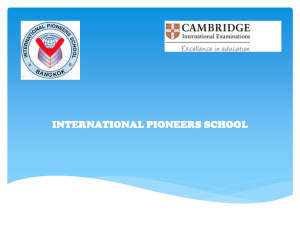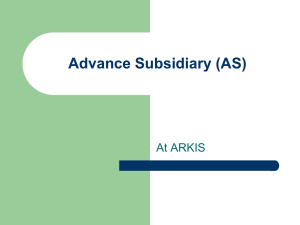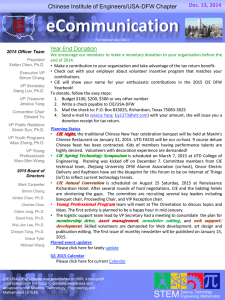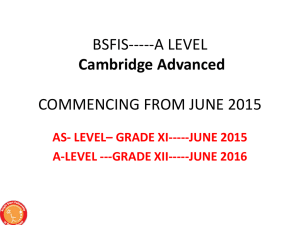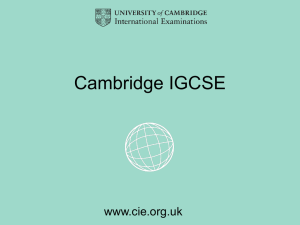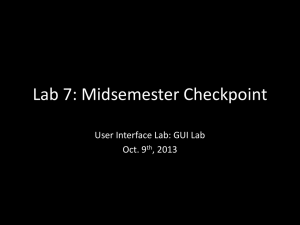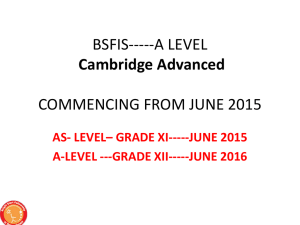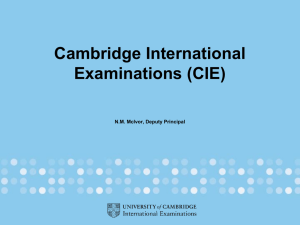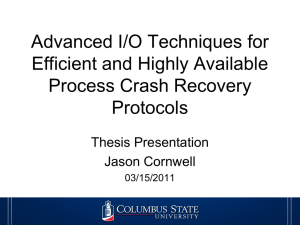checkpoint - Dorat Al Khaleej Private School
advertisement
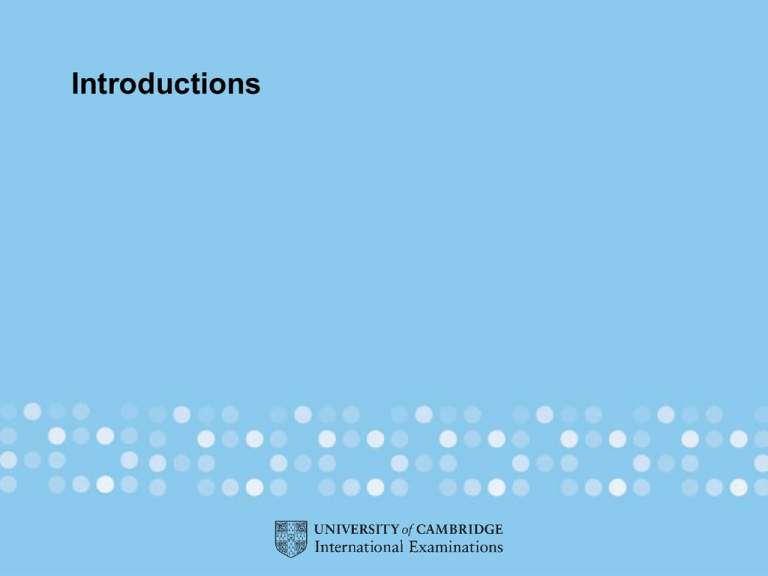
Introductions About CIE Part of the world-renowned University of Cambridge CIE is the world’s largest provider of international examinations Offers school qualifications such as IGCSE, O Level and A and AS Level, plus professional qualifications in areas such as IT, business and management Kings College About CIE CIE has over 6000 examination Centres in over 150 different countries Cambridge qualifications are recognized by universities, colleges and employers across the globe Downing College CIE Middle East & North Africa CIE Middle East and North Africa - Countries Algeria Bahrain Burkina Faso Chad Egypt Iran Iraq Palestine Jordan Kuwait Lebanon Libya Mali Mauritania Morocco Niger Oman Qatar Saudi Arabia Sudan Syria Tunisia UAE Yemen Total Centres 350 Qualification range International GCE Advanced Level and Advanced Subsidiary IGCSE, O Level and related qualifications Work related qualifications - Cambridge International Diplomas Diagnostic Tests – Checkpoint Cambridge International Primary Programme Qualifications for Young Learners - Cambridge ICT Starters Progression UNIVERSITY EMPLOYMENT A LEVE AS LEVEL e IGCSE O Level Checkpoint Primary CHECKPOINT Age 14 Cambridge International Primary Programme www.cie.org.uk/primary www.cie.org.uk What is the Primary Programme? The Cambridge International Primary Programme is a comprehensive provision for teaching, learning and assessment in the core subjects of English, Mathematics and Science, for children aged approximately 5 to 11. www.cie.org.uk Primary Progression Tests Cambridge Primary Curriculum Framework Teacher support materials Primary Achievement Tests = Programme www.cie.org.uk Key Benefits of the Progression tests • Provide an independent measure of student progress • Monitor progress and allow individual target setting • Highlight strengths and weaknesses to inform future teaching and learning www.cie.org.uk Key Benefits of the Achievement tests • Summative measure of performance at the end of the primary phase • Certificate of Achievement for all students www.cie.org.uk Teacher support resources • Planning booklet • E-learning course • Classroom resources • Schemes of work • Primary Teacher Support website and online community • Recommended text books and full mapping documents www.cie.org.uk To sum up The Cambridge International Primary Programme: Provides a curriculum for the core subjects of English, Mathematics and Science at the primary phase Provides recommended learning materials that encourage best practice in teaching and learning Provides a suite of assessments which enables schools to independently measure the progress of their students Provides a Cambridge certificate of achievement for students at the end of their primary schooling Was developed in consultation with a number of Cambridge schools around the world Provides a solid foundation on which learning at the secondary phase can build Cambridge Checkpoint www.cie.org.uk What is Cambridge Checkpoint? Checkpoint tests are provided by University of Cambridge International Examinations (CIE), one of the world’s leading providers of examinations Cambridge Checkpoint curriculum (from age 11 to 14) with diagnostic tests at the end of the programme Checkpoint tests are available in: English Mathematics Science Who is Cambridge Checkpoint for? Specially designed for students of about 14 years of age who are about to start courses leading to IGCSE or O Level in English, Mathematics or Science What are the benefits? Checkpoint is not a formal qualification - it is a useful progress check ahead of important external examinations at age 16 It identifies students’ strengths and weaknesses in a subject, individually, as a class, and for the school as a whole Students, and their parents, can see where they are doing well and where they should concentrate their effort Checkpoint can help students get better grades in the future What are Checkpoint tests like? 2 papers in each subject Each paper is about an hour long Questions are designed to be suitable for students of all cultural and language backgrounds Completed papers are sent to Cambridge to be marked by trained and skilled examiners Students are provided with a report and a Statement of Achievement Schools are provided with a report on the whole school and on individual teaching groups The Student Report Overall result for the subject Results in each major topic The student’s strengths Brief explanation of what each Checkpoint score means The student’s weaknesses Statement of Achievement Level of achievement reached by student across the whole test, expressed as score on Checkpoint scale Level of achievement reached in each of three main topics, expressed as score on Checkpoint scale The Centre Report Checkpoint score for subject as a whole Checkpoint score for each main topic area Checkpoint scale explained Performance of all students in each sub-topic When can Checkpoint tests be taken? Checkpoint tests are offered twice a year May October Results are usually delivered within five weeks of the test being taken Feedback is provided on the individual student’s performance and that of their cohort or year group Questions www.cie.org.uk/mena
